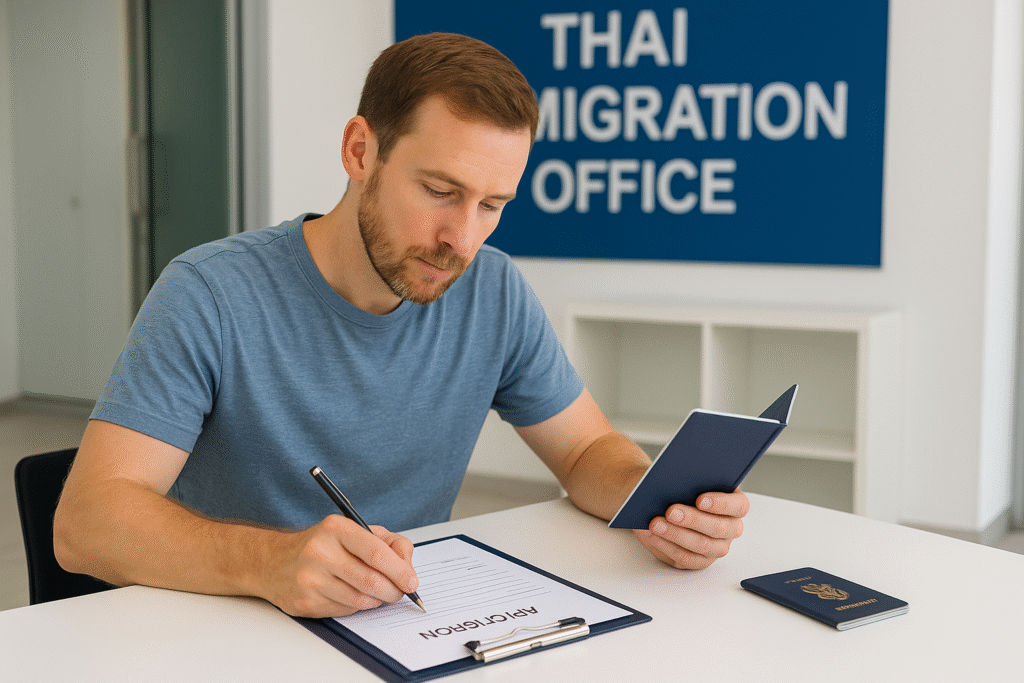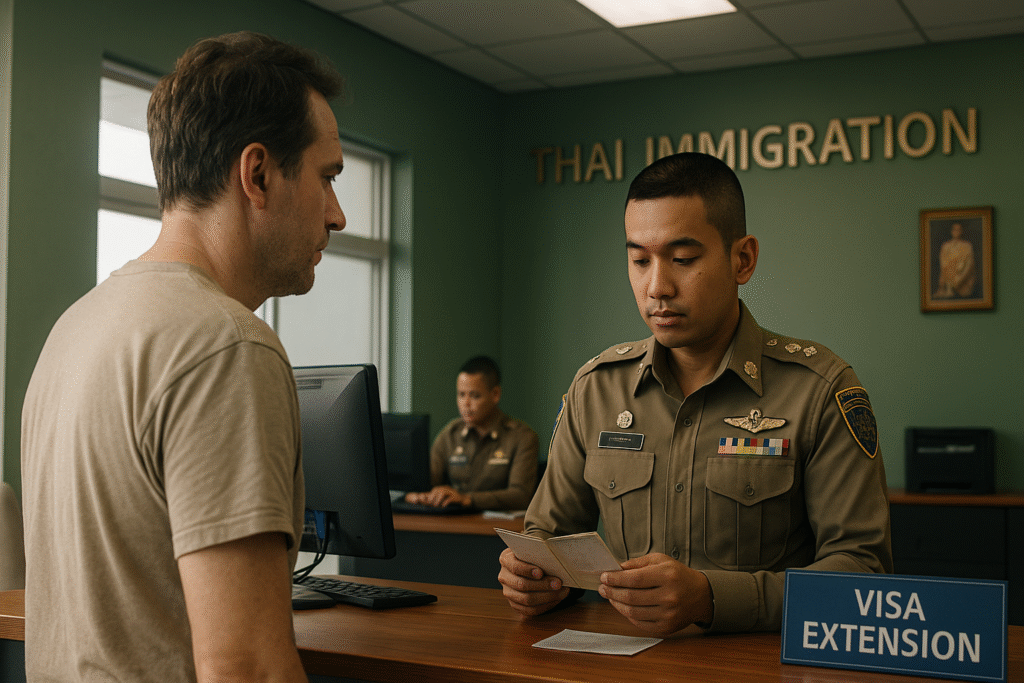Many travelers come to Thailand for a short stay but often find themselves needing more time whether for tourism, remote work, study, or family reasons. A Thailand visa extension allows you to legally prolong your stay without having to leave the country.
A visa extension is only possible if your original reason for visiting remains unchanged. For instance, if you arrived on a tourist visa and still need tourist time, you can apply for an extension. Similarly, if you entered on a non-immigrant visa and continue your work, study, retirement, or family status, you qualify for a visa extension.
However, a visa extension is not a means to change your purpose of stay, Thai Immigration strictly checks for consistent intent. If your short visit is becoming a longer stay, this guide on Thailand visa extension in 2025 will clarify who can extend, required documents, costs, timelines, common errors, and when you should consider switching to a longer-term visa.
Thailand Visa Extension: What It Is (and Isn’t)
A Thailand visa extension is a formal request submitted to Thai Immigration to extend your current permission to stay. This request is handled at the immigration office responsible for your registered address and allows travelers, remote workers, and other residents to legally extend their stay without leaving the country. A Thailand visa extension is particularly favored by those planning mid-term or rolling stays who want to avoid the hassle of cross-border travel.
A Thailand visa extension is suitable when you need just a bit more time to travel, finish a course, complete a project, or continue working or studying under an existing visa status. It also simplifies dealings with banks, landlords, and insurers who prefer a stable visa status over multiple entry stamps. Most importantly, a Thailand visa extension is not a workaround if your purpose of stay has changed, you must apply for the appropriate visa category instead of forcing an inconsistent extension.
Types of Visas Eligible for Thailand Visa Extension
Several visa types can be extended, depending on your visa status and documents. These include:
Tourist Visas
Holders of a 60-day Tourist Visa (TR) can typically apply for a 30-day extension, allowing for a total stay of up to 90 days. This suits travelers who want one extra month to finish their itinerary or wait out peak travel. Use it once, then decide if you’ll depart or transition to a more suitable status.
Visa Exemption Entries
Nationals from certain countries entering under the visa exemption scheme may be eligible for a one-time 30-day extension. It’s a helpful buffer if plans change or flights shift. Treat it as a single extension, not a rolling strategy to plan your next step early.
Non-Immigrant Visas
Visas issued under business (B), retirement (O/O-A), education (ED), or marriage categories can often be extended based on documented reasons, such as for (Non-B), that might be employer letters and corporate documents; for (ED), enrollment and attendance; for (Non-O/O-A), marriage or retirement evidence. When your paperwork is complete and consistent, approvals are smoother.
Multiple-Entry Tourist Visa (METV)
METV gives you multiple 60-day entries within its validity window. Each entry can usually be extended to +30 days in Thailand. To start another 60-day stay, you must exit and re-enter; the extension does not extend the overall METV validity.
LTR Visas
Holders of the Long-Term Resident Visa rarely need routine extensions but may still require specific procedural renewals depending on their category and circumstances.
Application Process for a Thailand Visa Extension
Thailand visa extensions are submitted at the immigration office with jurisdiction over your place of residence. The process involves:
- Book or Queue – Some offices require online booking, while others operate on a first-come, morning queue basis.
- Complete Form TM.7 – Available online or at the immigration counter.
- Submit Documents – Passport (with copies), passport photos, TM.30 address registration, proof of funds, and visa-specific supporting documents.
- Pay the Fee – Typically THB 1,900 for tourist visa extensions; other visa categories may differ.
- Receive and Verify Stamp – If approved, your passport will be stamped with a new permitted-to-stay date. Verify it on the spot and keep a digital copy for your records.
Applicants should apply well before their current visa expires. Overstaying even unintentionally can result in fines, denial of future entry, or blacklisting.

Timelines and expectations
Tourist visa extensions often finish the same day if your file is complete. Non-Immigrant cases can take longer, especially if extra checks are needed. Apply before your current permission expires; last-minute filings create stress and reduce your margin for error.
Common Mistakes and How to Avoid Them
- Unregistered TM.30 Address: Ensure your address is registered correctly, as unregistered addresses cause delays or denials. Hotels handle TM.30 for guests; if renting privately, arrange landlord or self-registration promptly. Immigration expects your address registration to be current. If you moved, update it first. Keep a copy in your extension packet.
- Mismatched purpose and documents: Names, dates, employer/school details, and addresses should match across every page. Small mismatches cause big delays. Your letters and proofs must support the same story. Align dates, employer names, school terms, and addresses to avoid back-and-forth.
- Cutting it too close: Arriving on the last day invites problems if a document is missing. Go several days early and bring photocopies of everything.
- Incomplete signatures and pages: Many refusals are procedural. Sign where required, number your pages, and keep a one-page checklist on top.
Important Legal Considerations When Extending Your Stay
- Overstaying Penalties: Overstaying your visa in Thailand is subject to a fine of THB 500 per day, up to a maximum of THB 20,000. Extended overstays can result in deportation or blacklisting.
- 90-Day Reporting: If you are in Thailand on a long-stay visa, you are required to notify immigration of your address every 90 days, unless your visa class provides an exemption.
- Re-Entry Permits: If you plan to leave Thailand temporarily and return, a re-entry permit is required to maintain your visa status. These can be obtained at immigration offices or at major airports before departure.
- Plan ahead during national holidays, as immigration offices are often closed.
- Never rely on informal advice or assumptions about visa-free entry or visa runs; immigration regulations are updated regularly and enforcement can vary by location.
- Use legal professionals when applying for non-standard visas, switching visa categories, or applying on complex grounds (e.g., marriage, work, investment, BOI promotion).
If you are a remote worker, business owner, consultant, or retiree, it is advisable to apply for a long-stay visa that aligns with your professional or personal situation.
Visa Options That Eliminate the Need for Extensions
Rather than relying on extensions, individuals intending to remain in Thailand for an extended period should consider applying for a visa that aligns with their lifestyle and legal intentions.
Long-Term Resident (LTR) Visa
The LTR Visa is Thailand’s most comprehensive long-stay option for remote professionals, retirees, and high-net-worth individuals. With a 10-year validity, work authorization through a digital work permit, and exemption from routine extensions, the LTR Visa is ideal for those who want to establish long-term residence with minimal immigration maintenance.
Digital Nomad (DTV) Visa
The Destination Thailand Visa (DTV) provides a five-year multiple-entry solution for remote professionals who work for overseas companies and earn foreign income. It allows for stays of up to 180 days per entry and is especially suitable for freelancers and cultural participants. While it cannot be used for local business activity, it provides an attractive alternative to repeated tourist visa renewals.
Thailand Privilege Visa
The Thailand Privilege Visa offers 5 to 20 years of residency and is best suited to individuals with passive income or personal savings. It eliminates the need for renewals, extensions, or border runs, and includes concierge immigration support and expedited processing.
SVBL can assist in determining which visa offers the best legal and financial advantages for your specific case and help structure your application to avoid overstays, denials, or compliance issues.

Extending Your Stay Through a Thailand Visa Extension
If you’re looking to stay longer in Thailand, at SVBL, we work with remote workers, digital professionals, and retirees who want to extend their stay legally, without relying on short-term workarounds that could jeopardize future re-entry.
If you are considering a visa extension or planning a long-term stay, SVBL can provide structured legal guidance tailored to your goals. Schedule a consultation and receive expert guidance on visa extensions and long-term residency in Thailand.


